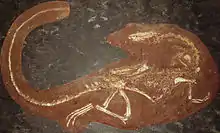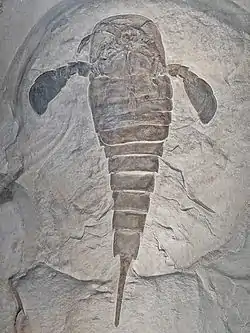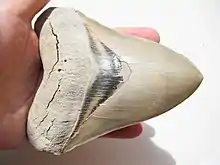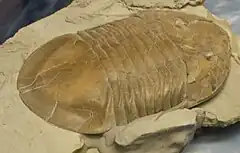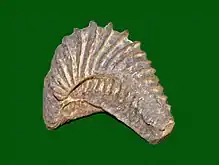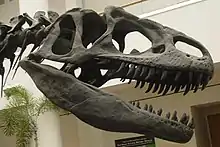
Map showing which states have state fossils (in blue; states without fossils are gray.)
Most American states have made a state fossil designation, in many cases during the 1980s. It is common to designate one species in which fossilization has occurred, rather than a single specimen, or a category of fossils not limited to a single species.
Some states that lack an explicit state fossil have nevertheless singled out a fossil for formal designation as a state dinosaur, rock, gem or stone.
Table of state fossils
States lacking a state fossil
- Arkansas
- Hawaii
- Minnesota
- The giant beaver was proposed in 2022.[28]
- Iowa
- New Hampshire
- The American mastodon (Mammut americanum) was considered in 2015.[30]
- New Jersey
- Rhode Island
- Texas
- The state dinosaur of Texas is Sauroposeidon proteles.[31]
See also
References
- ↑ "Official State of Alabama Fossil". Alabama Emblems, Symbols and Honors. Alabama Department of Archives & History. August 2, 2005. Retrieved March 19, 2007.
- ↑ "Georgia State Fossil". State Symbols, State Fossil. e-Reference Desk. March 30, 2014. Retrieved March 30, 2014.
- ↑ Illinois State Symbols, Department of Natural Resources, retrieved May 20, 2019
- ↑ Indiana lawmakers name mastodon as first state fossil, WHAS-TV, Associated Press, February 19, 2022, retrieved February 21, 2022
- ↑ "State Fossils - Kansapedia - Kansas Historical Society".
- ↑ "List of State Fossils". State Symbols, State Fossil. Fossilera. Retrieved September 1, 2015.
- ↑ "State Fossils - Kansapedia - Kansas Historical Society".
- ↑ "List of State Fossils". State Symbols, State Fossil. Fossilera. Retrieved September 1, 2015.
- ↑ "Kentucky State Symbols". Kentucky Department of Libraries and Archives. March 30, 2007. Archived from the original on January 28, 2011. Retrieved July 2, 2007.
- ↑ "Louisiana State Fossil". State Symbols, State Fossil. e-Reference Desk. March 8, 2015. Retrieved March 8, 2015.
- ↑ "Maryland's Official State Fossil Shell". Maryland Geological Survey. Retrieved February 16, 2017.
- ↑ Fossil whale: State Fossil of Mississippi (PDF), Mississippi Department of Environmental Quality, 1991, retrieved May 9, 2019
- ↑ "Nevada State Fossil | Ichthyosaur".
- ↑ "Nevada State Fossil: Ichthyosaur (Genus Shonisaurus)".
- ↑ "Fossil, Fossilized Teeth of the Megalodon Shark | NCpedia". ncpedia.org. Retrieved March 17, 2016.
- ↑ "5.071 State invertebrate fossil", Ohio Revised Code, retrieved February 9, 2021
- ↑ "5.078 Official fossil fish of the state", Ohio Revised Code, retrieved February 9, 2021
- ↑ "Oklahoma State Fossil | Saurophaganax Maximus". statesymbolsusa.org. Retrieved January 30, 2021.
- ↑ Official State Fossil – Phaecops rana (PDF), Pennsylvania Legislature, December 5, 1988, retrieved September 28, 2021
- ↑ "South Carolina Fossil". WLTX. Retrieved May 28, 2014.
- ↑ Utah State Fossil - Allosaurus from pioneer.utah.gov "Pioneer - Utah's Online Library" page. Retrieved on September 8, 2008
- ↑ Vermont has both a state terrestrial fossil and a state marine fossil.
- 1 2 "Vermont State Terrestrial Fossil". E Reference Desk. Retrieved March 17, 2018.
- ↑ "Mammoth Tusk Discovered 1865". Brattleboro History. Retrieved March 17, 2018.
- ↑ http://leg.wa.gov/Symbols/ WA State Symbols
- ↑ http://www.herald-dispatch.com/homepage/x112312085 Manchins signs bills involving snakes, fossils, research into law
- ↑ "Wisconsin State Symbols". State of Wisconsin. Archived from the original on January 12, 2010. Retrieved December 19, 2011.
- ↑ "Giant Beaver swamps competition to be Minnesota state fossil". MPR News. Retrieved September 15, 2022.
- ↑ "Iowa to consider recognizing official state fossil". The Seattle Times. January 23, 2018.
- ↑ Carlson, Brady (January 6, 2015). "Granite Geek: Will The Mastodon Become New Hampshire's Official State Fossil?". New Hampshire Public Radio.
- ↑ "Texas State Symbols". Texas State Legislature. Retrieved December 13, 2017.
External links
This article is issued from Wikipedia. The text is licensed under Creative Commons - Attribution - Sharealike. Additional terms may apply for the media files.

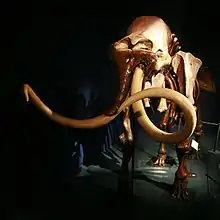
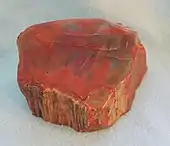


_-_close-up.JPG.webp)
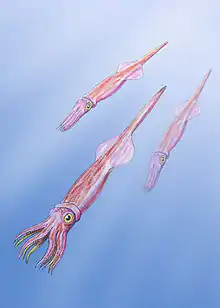
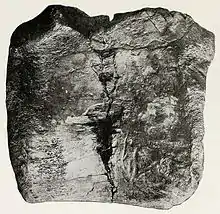
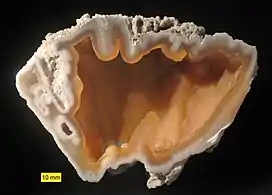





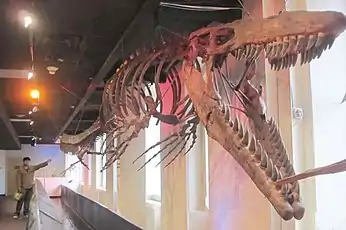
_slab_3.jpg.webp)
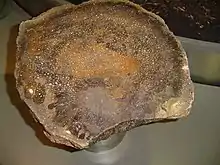

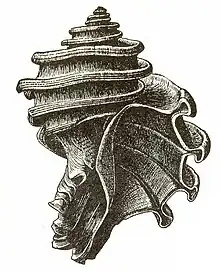
.jpg.webp)


